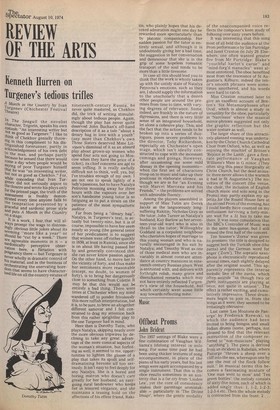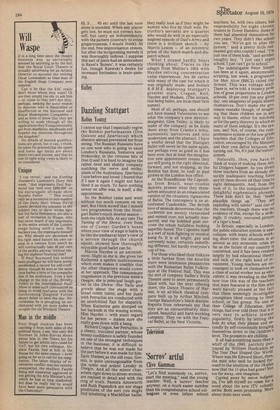Offbeat Proms
John Brideut
The 1957 settings of Blake were a fine culmination of Vaughan Williams's lifelong interest in solo song. For some time past he had been using thicker textures of song accompaniment, in place of the piano of his early years, but his last songs were again accompanied by a single instrument. That this is the oboe results sometimes in an austerity that is a far cry from 'Linden Lea', yet the core of consistency makes their parentage unmistakable — particularly in The Divine Image', where the gentle modality
of the unaccompanied voice reflects the composer's keen study of folksong over sixty years before.
It was interesting that this song most of all held the audience at the Prom performance by Ian Partridge and Janet Craxton On July 29. Elsewhere, one often wanted greater fire from Mr Partridge: Blake's "youthful harlot's curse" and "mind-forg'd manacles" went almost unnoticed. The oboe benefited most from the resonance of St Augustine's, Kilburn; indeed the tenor's smooth phrases were sometimes smothered, and his words were hard to catch.
Miss Craxton returned later to give an excellent account of Britten's 'Six Metamorphoses after Ovid', which is almost a study in versatility for the oboe, particularly in 'Narcissus' where the musical mirror-phrases suggested not only the graphic reflection but the water-texture as well.
The larger share of this attractively-planned evening was undertaken by the Christ Church Cathedral Choir from Oxford, who, as well as enjoying the mischief of Britten's 'Rejoice in the Lamb', gave a firstrate performance of Vaughan Williams's Mass in G minor. (They often sing this piece liturgically at Christ Church, but the dead acoustic there never allows it the warmth it had in St Augustine's.) The novelties of the concert (the venue, the choir, the inclusion of English church music and solo song in the Proms) may partly explain my appetite for the Round House fare at the second Prom of the evening, but I could hardly have counted on my enthusiasm surviving a forty-minute wait for a 31 bus to take me there. It was some consolation that the BBC's Controller of Music was in the same bus-queue, but I still missed the first half of the concert.
Tim Souster's `Zorna' was given its premiere: the title is designed to suggest both the Turkish oboe (the zurna) and the German word for anger ('Zorn'). The soprano saxophone is electronically reproduced several times, each slightly delayed after the original sound. This apparently represents the intense melodic line of the zurna, which often sounds "as though two or three instruments are playing at once, not quite in unison". The effect is rather exciting, and cumulatively impressive. Three drummers begin to join in, from the wings as it were; they seemed to be irritatingly obtrusive. Last came 'Les Moutons de Panurge' by Frederick Rzewski, to which the audience had been invited to bring bongos and small Indian drums (some, perhaps, not pleased to find that the relevant instruction of the composer re ferred to "non-musicians" playing "anything"). The piece is derived from an incident in Rabelais, where Panurge "throws a sheep over a cliff into the sea, whereupon one by one the rest of the flock follow suit." In musical terms this becomes a fascinating mixture of 'One man went to mow' and 'Ten green bottles': the melody consists of sixty-five notes, each of which is added singly thus: 1, 1-2, 1-2-3, 1-2-3-4 etc. Then the whole melody is contracted from the front: 2 . . .
65, 3 . . . 65 etc until the last note alone is sounded. When any player gets lost, he must not correct himself, but carry on independently with the pattern (contrary to ovine gregariousness, I would think). At the end, free improvisation ensues, but after the invigorating melody it was thoroughly tedious. I suppose this sort of piece had an antecedent in Ravers 'Bolero': it was certainly fun, though Rzewski's desire for incessant fortissimo is brain-paining.

































 Previous page
Previous page